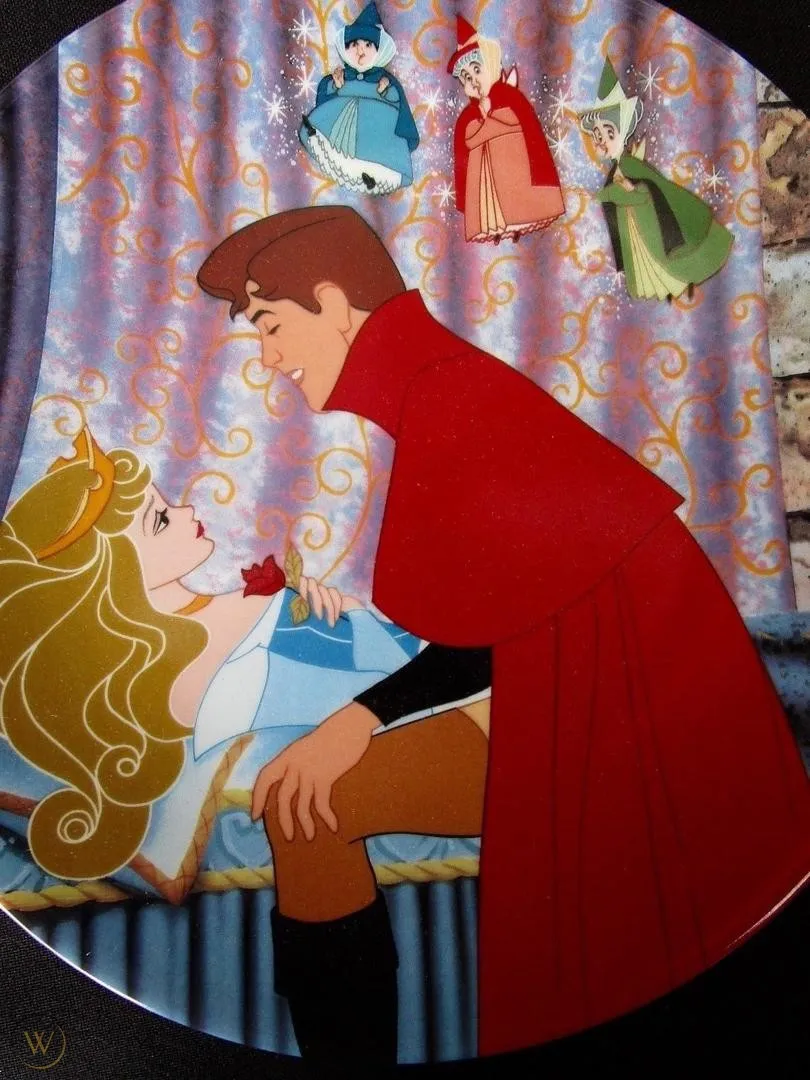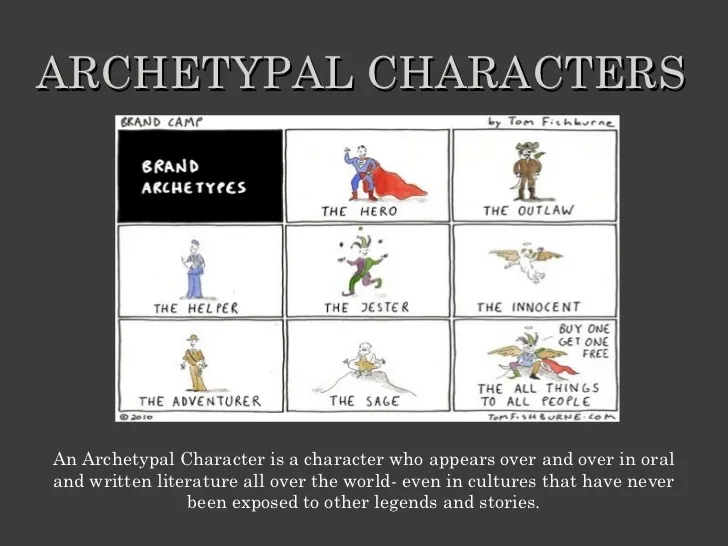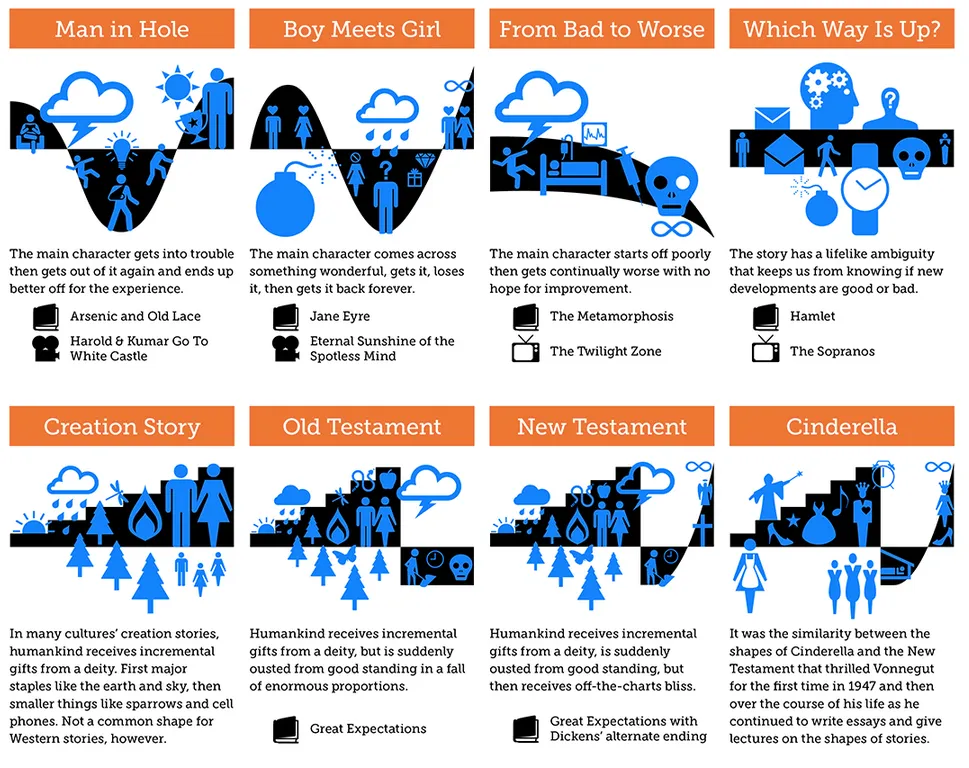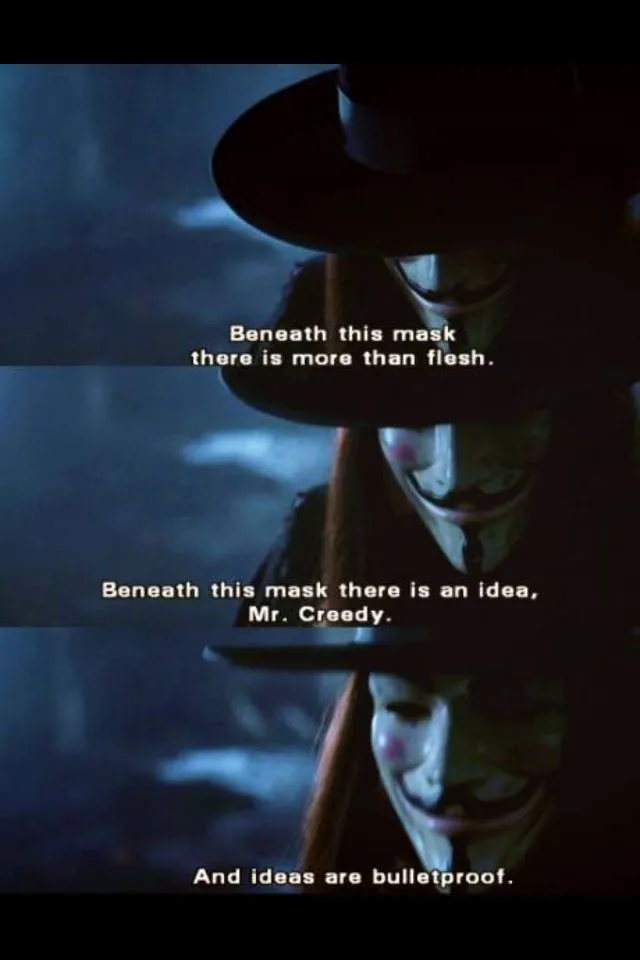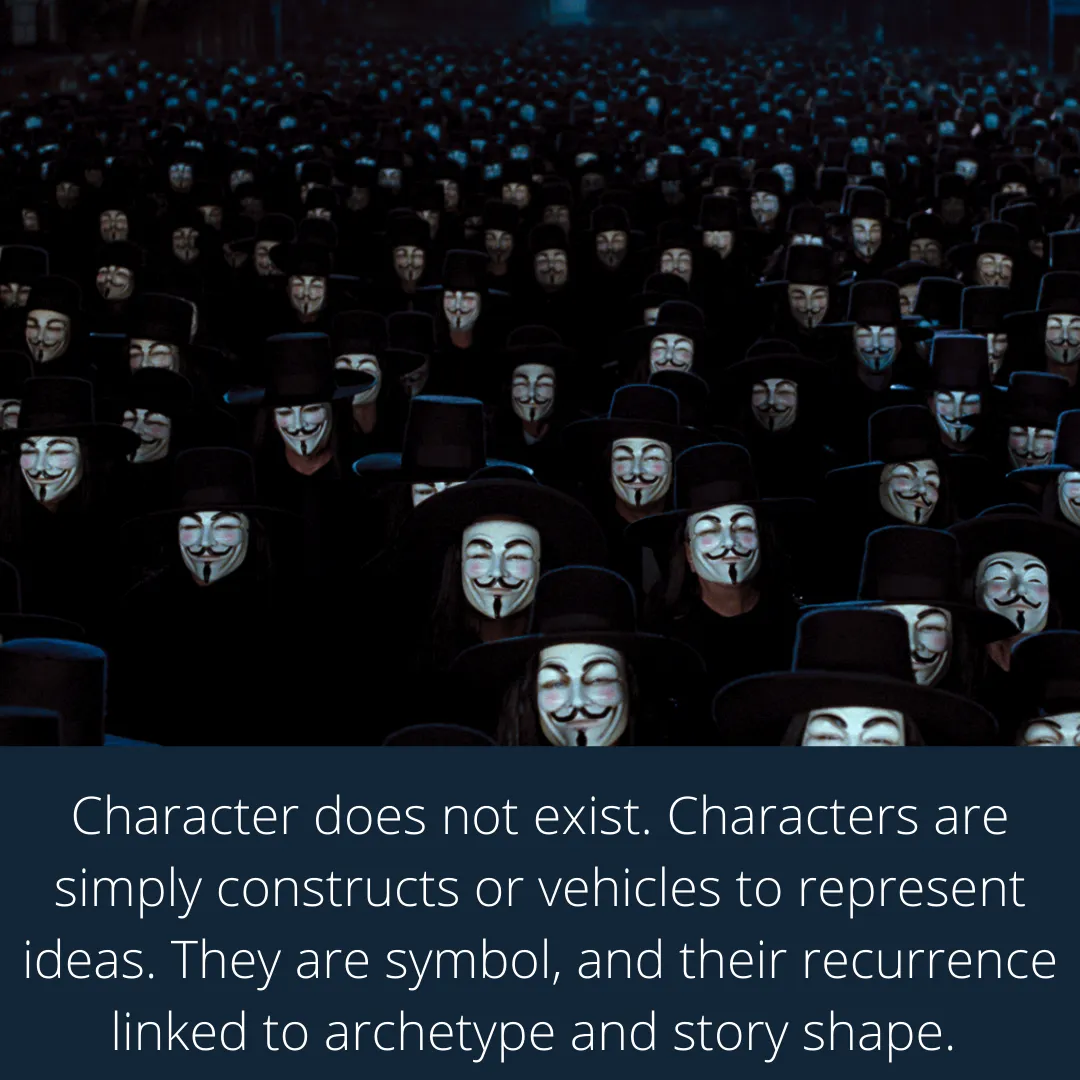
In a recent discussion about this topic, ‘Your most favourite fictional character’ – I decided to throw in a different perspective. I offered, what is character doesn’t exist? Then are they not simply constructs or vehicles for the representation of ideas.
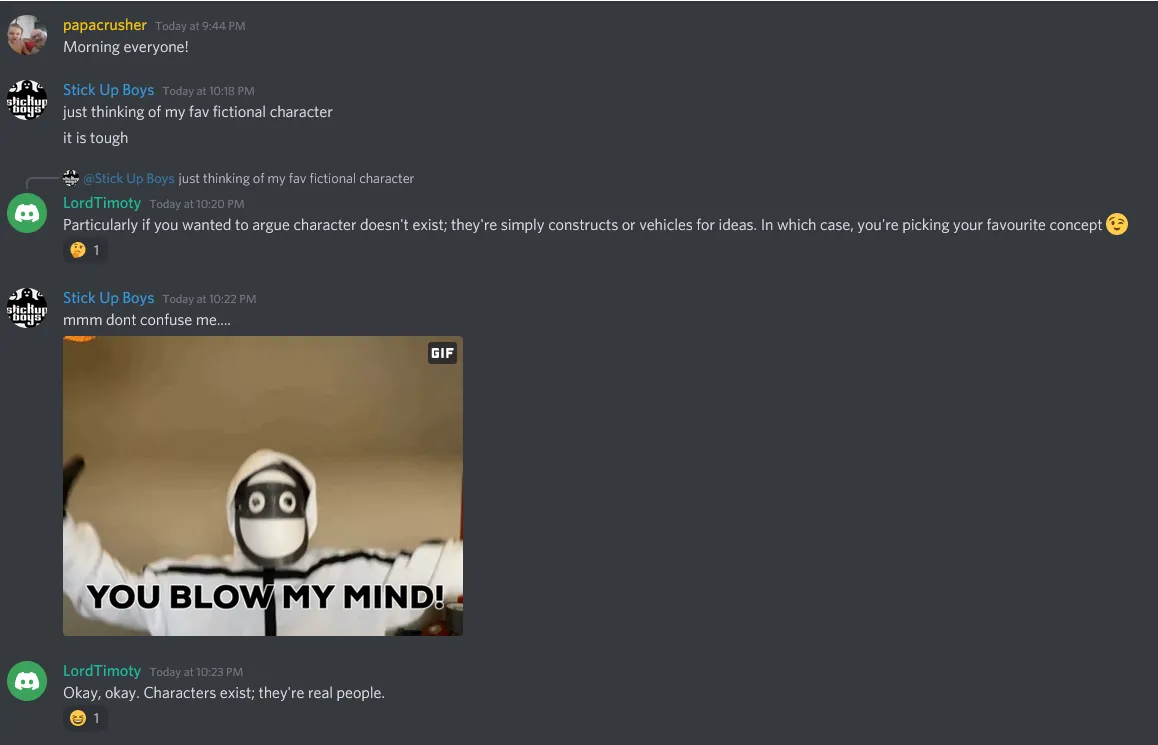
@stickupboys @papacrusher - In this blog post, I hope to build this idea - and perhaps thank the discord room for kicking off this discussion. I feel like it's a topic worth considering, although, perhaps it corrupts the 'favourite fictional character' prompt by arguing against the premise of the prompt. Who knows? Let's find out.
From this perspective, it’s about taking a step back and recognising that films are constructed for a purpose; the various cinematic techniques become part of a manipulation to persuade you to an idea.
Take, for instance, ‘The Truman Show’ – the world of the narrative is calm, peaceful, and the eponymous Truman seems to have the perfect existence – but pull back the layers, and the film’s message is about surveillance, perhaps peppered with ideas around homogeneity in the human experience. Truman, as a character, isn’t ‘real’ in the sense that we could bump into him on the street, so in the absence of existing – he is simply a construct; an idea. Perhaps he symbolises mundanity, or naivety – perhaps something darker, our innate willingness to be controlled?
To continue in this thread, pick any Disney princess. Belle, Snow White, Sleeping Beauty – take your pick. Being cartoons, they are easier to be removed from, in the sense, while you might see Jim Carey on the street and mistake him for Truman, if you were to see a cartoon woman walking towards you – you have bigger problems than this post has time to deal with. But, like Truman, they also shine a light on the idea of control by fabricating a narrative that women should be valued on their innocence, beauty and that they can only be truly happy with a man. That man, as it turns out, chooses the woman – with the assumption that he cannot be rejected. Imagine if you were sleeping in the woods, and a strange man came up and gave you a big wet kiss? What would you do? Common sense tells us we would throw a string of expletives his way; but why do we have a niggling feeling that there is something very romantic and the daring of the act is enchanting?
Definition of ARCHETYPE: a recurring character or idea that is seen over and over again in a text. This patterned representation make them easy to identify and draw associations with or against. In a nutshell, unique characters don’t exist – they all fall under the umbrella of a particular archetype, of which, there are only 12 (depending on who you source - Jungian Psychology would say 12, other literary theorists could say 8. They're given different names or categories, but they're interchangeable).
Our mate Truman fits the ‘Hero’ archetype, while our Disney Princesses all fit the ‘Damsel in Distress’ archetype.

Yet – in each Disney princess representing the same idea, perhaps we’d notice that each story is the same too. Girl in distress, girl needs saving, man rescues girl and they live happily ever after. Kurt Vonnegut, one of my favourite literary theorists has analysed 10000s of narratives from Western cultural backgrounds, and he theorised (back in the 1970s would you believe?) that there are ONLY 8 stories that can be told. Have a look, it’s really fascinating. He calls them the ‘shape of stories’ – and the maps below should the rising and falling fortunes of characters. On Youtube, you’d find a number of clips of him speaking about this if you wanted to dive deeper:
And, for all of that, I think I’m ready to offer, not my favourite character, but my favourite idea. For the record, I’ll be drawing on the anti-hero archetype for this one!
To introduce my choice, I will let the construct speak for himself, and what an introduction:
"The only verdict is vengeance; a vendetta, held as a votive, not in vain, for the value and veracity of such shall one day vindicate the vigilant and the virtuous. Verily, this vichyssoise of verbiage veers most verbose, so let me simply add that it is my very good honor to meet you and you may call me V."
You can watch the introduction here. It's delightful from the get-go:
Already then, we can see that the character introduces himself as an idea.
- Vengeance, an act of seeking restoration.
- An agitator for the vigilant and the morally right.
- Claiming his own moral right (held as votive – think prayer candles in Catholicism).
Let’s go back to the theory:
- A story about vengeance and restoration? Name your Shakespeare play – the majority of them are about revenge and restoring the chain of being. Macbeth comes to mind. Macduff seeks to murder Macbeth for killing King Duncan and his own wife; with Macbeth’s death, the crown is restored to the rightful heir.
- A character claiming moral right in order to do immoral acts? This kind of relativism sounds like Robin Hood or Batman? Does it not?
Now, through the film, V's identity is shrouded in secrecy; he is nothing more than a man in a mask and a cape. This helps elucidate the premise that he is simply an idea.
The film itself was actually based on a comic, and it's purpose was to act as a protest against conservative politics. The film seeking to criticise Thatcherism in the UK, building on the Comic's criticisms of Reaganism. The film speaks about power and governance, and offers that politicians will always be corrupt, if we sit back and do nothing. The film's deliberate allusions to the Guy Fawkes Gunpowder Revolution of 1605 is central. The plot attempting to blow up Parliament and reset the political sphere.
What an observation, then, from V - who in talking with Evie, declares:
People should not be afraid of their governments, governments should be afraid of their people.
This is a four second video, if you want to hear it in his own voice:
This is cemented in the film's fight scene, which would rival any Tarantino film. Having been shot multiple times, in response to asking why he cannot die, V responds: 'Ideas are bulletproof'. He transcends character and becomes a walking metaphor. A figurative concept, whose mask and cape serve not to create character, but give a physical embodiment to an abstract concept.
Have a look at the bulletproof scene here:
And, if you didn't watch those four minutes of cinematic brilliance, here's the cheat sheet:
With that in mind, let's back up - let me take you back to the opening scene where V has set significant landmarks around London to blow up. Honestly, it is one of the most powerful scenes in cinema, if not for the special effects, then it's pairing with the music:
In starting off, V quotes these powerful words: 'Remember, remember, the fifth of November. The gunpowder treason and plot. I know of no reason why the gunpowder treason should ever be forgot.'
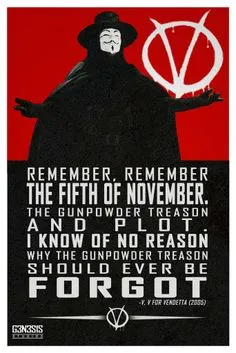
It is then, perhaps significant that V suggests, 'We are told to remember the idea, not the man, because a man can fail. He can be caught, he can be killed and forgotten, but 400 years later, an idea can change the world.
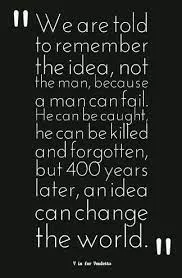
Again, this goes to reinforcing the point of this post, that characters simply do not exist. V could be Guy Fawkes, he could be someone else - it doesn't matter, but it's the idea that we associate with him that is important. As an 'Anti-Hero' archetype, he is going to achieve an outcome, doing so through questionable actions. He blows buildings up and murders people in power - that's what we call 'questionable ethics' - however, the end justifies the mean, as he hopes to bring about revolution.
This takes me to the final scene, as 1000s of protestors, wearing dark capes, dark hats and uniform masks take to the streets. They march, not as themselves, but as a single idea and a single voice - their individuality lost, no character discernible. Can you see yourself in their shoes?
Thanks for your time, if you'd like to check out the CineTV compestition post, you can find the link here. Good luck to all in the contest; it's been awesome seeing such a wide variety of characters popping up in my feeds.
Tim

